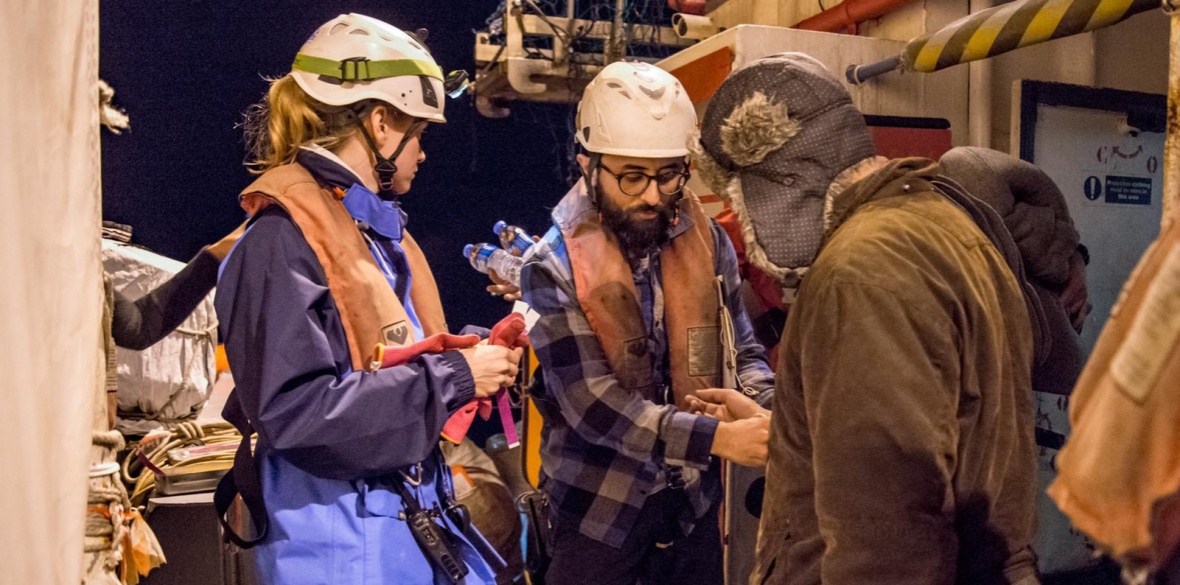This is the last article you can read this month
You can read more article this month
You can read more articles this month
Sorry your limit is up for this month
Reset on:
Please help support the Morning Star by subscribing here
IN JANUARY, Mina Naguib and the crew on board the civil migrant-rescue ship Sea Watch 3 witnessed an EU-sanctioned breach of international human-rights law.
“On the morning of the 9th, early in the morning, we heard information of a boat in distress,” says Naguib, an emergency-medicine doctor based in Manchester who was volunteering as a medic with the German charity Sea Watch.
But by the time the Sea Watch 3 arrived at the co-ordinates, the so-called Libyan Coastguard was in the process of intercepting the boat and, presumably, returning the refugees on board to the humanitarian disaster they’d risked their lives to escape.
“As we were watching there was a plane overhead,” Naguib says.
“It’s difficult to know for sure, but it looked like a military plane. It may have been part of the EU’s border control.”
In April 2019, under pressure from Italy’s then populist far-right coalition government, the European Union pulled all naval assets from its military mission, European Union Naval Force Mediterranean (Eunavfor Med).
Eunavfor Med — commonly referred to by its rather more palatable nickname “Operation Sophia” — was set up in 2015 as a response to the dramatic increase of irregular migration across the world’s deadliest border.
Though the whole point of Operation Sophia was to “identify, capture and dispose of vessels and enabling assets used or suspected of being used by migrant smugglers or traffickers,” as its website states, it’s thought to have saved well over 40,000 people from watery graves.
When the EU dropped its ships from Operation Sophia, it began instead to train, equip and fund the Libyan Coastguard — which routinely returns refugees and migrants to a country blighted by civil war since 2011.
Operation Sophia continues but now only uses aerial assets to monitor the situation from the skies. The civil refugee-rescue fleet has frequently accused the mission of aiding the Libyan Coastguard.
“Frustration, anger and sadness all sort of merged into one,” Naguib says, describing what it was like watching the interception.
“I mean there’s a reason that these people were leaving Libya.
“Some of the guests with us may have been living freely, like the Libyan families that were on board who were escaping a war.
“For some of the other guests, yes there was the war, but the reason they were escaping was because they had been held in inhumane conditions.
“And knowing what would happen to the returned, or at least what has been documented to have happened, you can only presume that they would be facing a similar fate.
“Watching the Libyan Coastguard take them on board was really quite upsetting. There was definitely a deflated mood at that point.”
After that disturbing incident, the Sea Watch 3 would go on to save the lives of 119 people from unseaworthy vessels in three separate missions.
“The first boat was largely migrants coming from various places in sub-Saharan Africa. The second boat was Libyan families fleeing the war in their country.
“The last boat was people from a lot of different backgrounds: North Africa, Bangladesh and a few other places.
“It was quite stressful at times because of the numbers of people. Myself and another doctor, a senior trainee in anaesthetics from Germany who was brilliant to work with, were having to very quickly assess everyone to identify any immediate issues.
“Although we specialise in emergency care back home, caring for someone on a ship in the middle of the sea isn’t exactly the best place to be looking after emergency cases. It was a relief that wasn’t needed.”
Left in Europe’s hands it is unlikely that any of the 119 people would have survived the crossing.
From what Naguib and the Sea Watch 3 saw during its third rescue, which happened inside Malta’s own search-and-rescue (SAR) zone, it appears Europe’s policy is to leave refugees adrift in the Mediterranean to their own fate.
“I wasn’t the one having these negotiations,” Naguib says. “So the exact details weren’t conveyed to me. But we initially had some information that the Maltese Navy were going to be carrying out the rescue.
“In the meantime we sent out our Rhibs [rigid-hull inflatable boats] to go over to the boat with life jackets and to stand by ready to make sure that no-one drowned in the interim.
“We waited and we continued waiting. It was cold. Their boat was overcrowded. It was not in the best condition by any means.
“So eventually we made the decision that we couldn’t wait any longer. We weren’t getting any definitive time frames from the Maltese Navy. So we made the decision that we just need to bring the people on board.
“Initially there was some thought that the Maltese Navy might later take them from us. Of course that never happened.
“Then the next night — time blurs into one but I think it was the next night — we and, as far as I am aware, the Maltese Navy were notified at the same time of another boat in distress.
“So to clarify, this would have been the fourth group had we ultimately taken them on board.
“We headed as fast as we could to them. Again we deployed our Rhibs and got everyone into life jackets.
“Eventually the Maltese did turn up this time. But it was all a bit bizarre in terms of how slow they [were] to arrive and how slow they [were] to actually do the embarkation.”
After that, the crew decided it was time to take their guests to dry land. They waited four days for Europe to assign them a port of safety. Then on January 16, the crew disembarked all 119 guests in Sicily.
Two days later, a tired and apprehensive Naguib speaks to me over the phone from beside the ship before returning home to Manchester.
“Where you’re born is some sort of bizarre lottery,” he says when I ask him what motivated him to volunteer with Sea Watch.
“None of us choose where we are born. You just end up where you end up.
“Yesterday morning I was on deck, chatting to the guests that we had on board as they were being disembarked. I could walk off and be totally free to travel anywhere. Meanwhile, they were being taken off to an Italian detention centre.
“It’s a complete inequality that is of no fault or function of anyone’s individual action. So I feel that everyone should be allowed to live a safe life.
“Fundamentally it’s very simple for me, people shouldn’t be left to drown in the sea. And if I’m in a position where I am privileged enough to be able to be of some use and to provide some help, then I feel that’s what should be done.”
“According to EU law, its own actions are illegal,” he says.
“The UN’s 1951 Refugee Convention as well as the EU Convention on Human Rights both say that everyone is entitled to seek asylum.
“It doesn’t mean they’ll get it, but everyone should at least have the opportunity to attempt to get it.
“But that shouldn’t mean risking your life in the process, or else what’s the point? It’s called protection law, but there is no protection if you are having to risk your life to seek that protection.
“One of the fundamental tenets of the 1951 Convention is nonrefoulement, i.e. returning anyone seeking asylum or granted asylum to a place where they may be subject to persecution or danger. And yet that is precisely what current EU policy is doing.
“So when the EU talks about European values and universal principles, I think there’s a lot of questions that have to be asked about what they actually mean by that when they’re funding the Libyan Coastguard.
“There are questions about their own conduct. But beyond that, they’re taking them back to a place where they will face terrible conditions.
“And that’s very well documented by journalists, the IOM [the International Orga\naisation for Migration], the UNHCR [the UN refugee agency]. We can’t pretend we don’t know what’s happening.
“There should be no need for Sea Watch to exist. The fact that there is, is a complete failure of policy.”
Find out more about Sea Watch on their website here: mstar.link/SeaWatch, and check them out on Twitter here: @seawatch_intl.
Ben Cowles is the Star’s web editor. You can follow him on Twitter via: @Cowlesz.

 Ben Cowles
Ben Cowles








